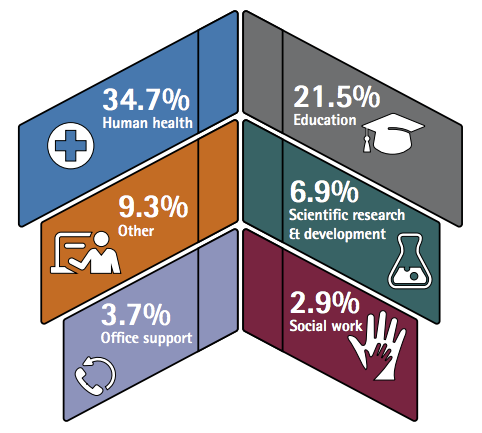
14 Research producers vs consumers
🏠 Self-study
In my view, Beth Morling makes a very useful distinction between research producers and research consumers. Examples for research producers are researchers at universities, PhD students or undergraduate students conducting research projects. Examples for research consumers are clinical psychologists, educational psychologists, counsellors, organisational psychologists, and many other types of psychologists working in applied fields.
A Careers Destinations report published by the British Psychologcal Society (BPS) showed that only about 7% of psychology graduates work in scientific research and development:
If it is somewhat unlikely that you become a research producer, why should you care about research? Beth’s and my answer is that it is just as important to understand how research is produced if you are a research consumer. Why? In my view, applied psychology can only be as good as the research that underpins it. As an applied psychologist, you will need to make decisions, for example, you might need to decide what type of therapy to recommend to a client. (Even as a student, friends or family members might ask you for advice!1)
These recommendations should be based on scientific evidence. I would argue that as psychologists, we have a duty to make the best possible recommendations given current scientific evidence. To make these recommendations, a research consumer needs to be able to understand and critically analyse research. And to learn and improve on these skills, it is important to also have produced research. Therefore, we will focus on both critically analysing existing research as well as producing our own research in this module.
14.1 Confirmation
Please confirm you have worked through this chapter by submitting the corresponding chapter completion form on Moodle.
One of my teachers once said that hearing that you study psychology will divide people into two groups: Those who take a step forward, and those who take a step back.↩︎